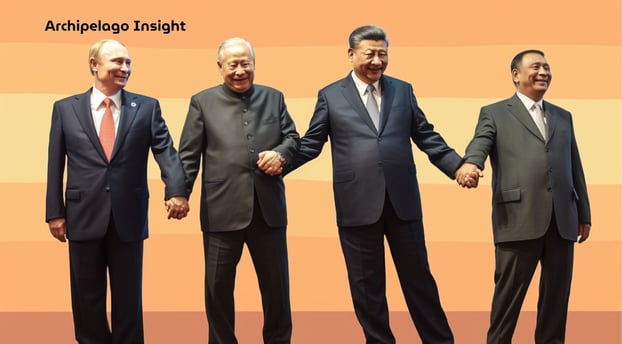Indonesia Evaluates Potential Membership in BRICS as Six New Members Join at 15th Summit
What are the potential benefits and drawbacks for Indonesia in joining BRICS?
POLITICS
8/27/20234 min read


The acronym BRICS represents Brazil, Russia, India, China, and South Africa. Emerging economies account for approximately 42% of the world's population and 23% of the world's GDP. The significance of BRICS rests in its potential to evolve into a formidable economic bloc capable of challenging the dominance of developed nations in the global economy.
The combined GDP of the BRICS nations is now greater than that of the United States, and it is anticipated that the group's importance will continue to grow in the coming years.
BRICS has also had an effect on the global economy by promoting the use of currencies other than the US dollar.
In recent years, there has been a trend among BRICS nations to use their own currencies in international trade rather than the US dollar. This has reduced their reliance on the United States dollar and increased their economic independence.
Some member countries have already established non-dollar-based trade agreements with other nations. For instance, China, the world's largest oil consumer, has agreements with non-dollar nations such as Russia and Saudi Arabia.
China, the United States, India, Japan, Indonesia, Germany, Russia, Brazil, Turkey, and the United Kingdom will be the top 10 economies in the globe by 2030, according to the Organization for Economic Cooperation and Development.
BRICS is referred to as a "new world order" by the Indian newspaper "India Narrative," but it is not the type of new world order that Western globalists have envisioned. By 2030, the BRICS nations' combined GDP will surpass that of the G7.
It is anticipated that Western leaders will take action to prevent BRICS from altering the global hierarchy, which could include military confrontations with China and Russia. China and Russia proposed a gold-based currency at the previous BRICS meeting, but India rejected the idea to avoid US retaliation.
However, US control is deteriorating, and the dollar may swiftly lose value due to declining demand, resulting in inflation or even a total collapse.
As BRICS expands to include more nations, its members will acquire greater influence in international organizations that have been dominated by Western powers historically. This substantial transition will result in significant geopolitical realignments and power struggles.
India, the world's third-largest oil consumer, conducts business in rupees with 18 nations and avoids the dollar in crude transactions with Russia.
Brazil and China conduct trade in their respective currencies, while Russia now favors the renminbi over the dollar. Even the central bank of Iraq has authorized yuan transactions.
Recently, Johannesburg hosted a BRICS meeting where the group made it plain they are no longer satisfied with the status quo of the US dollar.
Six new countries have joined the alliance, bringing the total number of members to eleven (now known as BRICS-11). Saudi Arabia, Argentina, UAE, Egypt, Iran, and Ethiopia are among the new members. In addition, twenty other nations are awaiting membership.
How does Indonesia's trend toward using alternatives to the US dollar compare?
Indonesia is now resolving international trade in its domestic currency rather than the US dollar, joining other nations that have adopted this practice. The country's central bank governor stated that this action is consistent with the de-dollarization trend observed by BRICS nations.
Bank Indonesia seeks to expand the use of the rupiah in international commerce and investment and to bolster its ability to stabilize the rupiah on foreign exchange markets dominated by major currencies.
However, the rupiah remains vulnerable, having depreciated by 1.58 percent against the dollar so far this year, even in its domestic markets.
Indonesia is still evaluating BRICS membership.
Indonesia is presently evaluating the possibility of joining BRICS. President Joko Widodo stated that prior to making a decision, a comprehensive analysis and cost-benefit analysis will be conducted.
Any anti-Western sentiment would be in conflict with Indonesia's autonomous and active foreign policy, which prioritizes non-alignment with global powers and military alliances. As a founding member of the Non-Aligned Movement, Indonesia prioritizes non-interference in great power rivalries and the promotion of world peace and social justice.
During its presidency of the G20 in 2022, Indonesia worked to mediate peace between Russia and Ukraine. Joining BRICS could cause Indonesia unneeded complications in this regard.
In addition, joining BRICS may be interpreted by the West as an alignment with Russia and China, which could strain Indonesia's diplomatic ties with the United States and other Western nations, while we are aware that Indonesia continues to rely significantly on US financial assistance.
Indonesia intends to propose a free trade agreement (FTA) with the United States for certain minerals, including nickel, so that companies in the country's electric vehicle (EV) battery supply chain can receive US tax credits. If Indonesia joins BRICS, its position will be threatened.
After participating in the 15th BRICS Summit in Johannesburg, President Widodo acknowledged the robust economic ties between Indonesia and BRICS nations. However, Indonesia has not yet submitted an expression of interest letter, which is a prerequisite for joining the BRICS.
Indonesia is a member of the G20, RCEP, the Organization for Islamic Cooperation, and APEC, which also comprises 11 BRICS members. Indonesia's guiding principle is that all competition must be resolved through cooperation and collaboration aimed at mutually beneficial outcomes.
BRICS loan programs are less stringent than those of Western nations and institutions. If Indonesia wishes to join BRICS, the government will assemble a committee of experts to ensure that this is the best course of action.
Without becoming a member, Indonesia's bilateral relations and free trade agreements with each BRICS nation continue to expand.
***
Archipelago Insight, 2023
